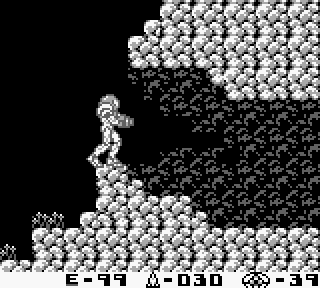Video game reviews dominated my early years. I read GamePro and EGM from the readers’ artwork in the front to the Game Genie codes at the back. I was always that kid in the magazine section of the supermarket for hours on end.
At this time, many of my friends had already moved up to the Super Nintendo, but I had only an original Game Boy. While my rich friends were playing and boasting about Super Metroid in full 16-bit SNES glory, I calculated how many more weeks of chores I’d have to put up with until I could afford Metroid 2. I thought, "Four more weeks of limescale scrubbing and I’ll be able to reunite with Samus Aran and her four shades of gray."
 I mean, just look at that space suit
I mean, just look at that space suit
For me, the single most important purpose of video-game reviews is to single out great titles from mediocre ones so that consumers don't spend their hard-earned money on games they won’t enjoy. I also appreciate that professional reviewers catch things that a layman like me never will. No matter how long I stare at a game, I cannot tell if you if it’s running at 60 frames per second or if it’s running at true 1080p resolution. I also can’t tell you if the battle system in this particular JRPG is comparable to any of the Breath of Fire, Dragon Quest, Final Fantasy, Tales of Symphonia, or Ys releases in the past twenty years. That’s what I depend on reviewers for, and for these things I sincerely say, “Thank you”.
On the other hand, the only thing I can tell you is how I personally feel about a game. For example, Fallout 3 was a critically acclaimed “Game of the Year” in 2008, but I truly hated the user interface for the Pip-Boy 3000. I know I'm in the minority, but the user interface drove me insane enough to quit the game for the sake of my mental health.

Pip-Boy 3000: the bane of my existence!
My reliance on reviews can sometimes get me into trouble, though. I expect a “good” review to discuss the game’s strengths and shortfalls, but sometimes the information they share can completely kill your desire to experience the game for yourself. This is exactly what happened to me with Metroid: Other M.
Nintendo's surprise E3 trailer last year completely fascinated me, and the release date immediately seemed light-years away. With every new trailer and and set of first-look impressions, I became more and more excited to get my grubby hands on the game. My obsession was so great, I even had a timer counting down to the release date.

I guess I can wait, afterall.
The ironic and anti-climatic thing was that I was actually out of town when the game finally hit the shelves. So, in lieu of buying the game, I decided to check out the early reviews. When I did, boy did my heart sink like the Titanic. I didn't mind the nitpicking of the technical details, but one review also provided an in-depth explanation on how this game singlehandedly killed off one of the most beloved franchise of all time.
Even though this argument did not technically contain any plot spoilers, it had a great effect on me. This information was like the solution to a magic eye puzzle: once I know what’s beneath the pattern, I can't "unsee" it. My opinion of Metroid: Other M changed irrevocably that day. Reading that review sucked away all of the enthusiasm I had for the game
In a way, this is the classic “Ignorance is bliss” scenario. I can't blame the writer for doing his job, but I can help but think I would be better-off if I hadn't read that review. When I have my hopes up for the next game, perhaps I will take a risk and follow my instincts. Who knows, maybe I’ll even discover a secret energy tank because of it.


